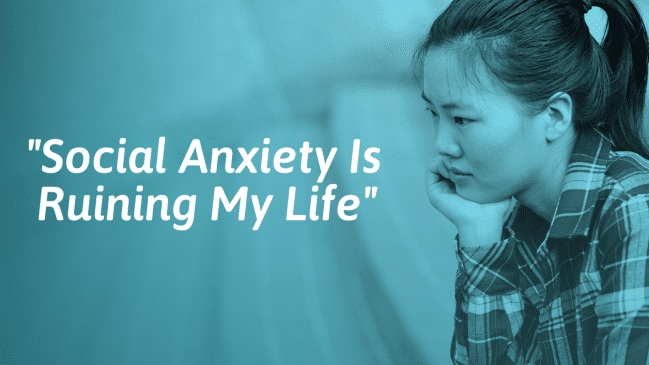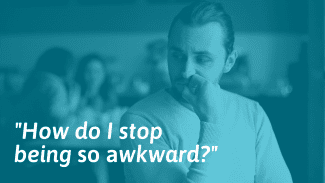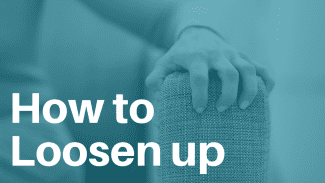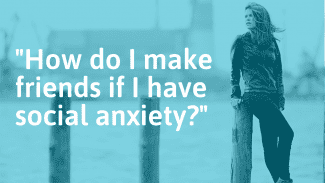“My social anxiety is ruining my life. I’m unemployed, lonely, and don’t have any friends. Is there a cure for severe social anxiety? I’m sick of being a recluse.”
If you feel like social anxiety is a barrier between you and all the things you want to do in life, this article is for you. I’ll go in-depth into what to do if you feel like social anxiety is ruining your life.
While most people might not get rid of their social anxiety completely, there is some good news: you can learn to cope with your social anxiety. Even if it may be severe, you can improve your current situation with the strategies in this guide.
What to do if your social anxiety is ruining your life
The advice in this guide is based on a type of therapy called cognitive-behavioral therapy, or CBT. Psychologists often use CBT with clients who have social anxiety disorder[5] but you can also try it by yourself.
The main idea behind CBT is that our thoughts, feelings, and behaviors all influence one another. If you have social anxiety, they can keep you trapped in a negative cycle that stops you from socializing.
For example:
- You think, “I’m an awkward loner, and no one wants me around.”
- You feel too embarrassed to be around others because you think they will all reject you.
- This affects your behavior. You avoid going out and talking to other people. Because you don’t start conversations or interact with anyone, you don’t make any friends.
- You take this as proof that you are a “loner,” and so the cycle continues. You become increasingly isolated, and your anxiety gets worse.
To break free from this kind of pattern, you need to:
- Identify and conquer your negative thoughts
- Expose yourself to uncomfortable social situations
- Learn to cope with feelings of anxiety
- Focus outwards rather than inwards
- Raise your self-esteem
Research shows that self-help can teach you how to cope with social anxiety.[6] This article will give you some self-help techniques that will show you how to feel more comfortable in social situations and improve your social skills. You’ll also learn how and when to get professional advice.
1. Make a fear ladder
Make a list of specific social situations that scare you. Give each one a rating on a scale of 0-100, where 0 is “No fear at all,” and 100 is “Extreme anxiety.” Next, place them in order from least to most intimidating. This is called a fear ladder or fear hierarchy.
For example:
- Deliberately making eye contact with someone [50]
- Interacting with the cashier at the grocery store [75]
- Ordering a takeaway coffee [80]
- Asking a shop assistant for help finding a product [85]
- Making small talk with my colleagues in the morning [90]
If your list is long, you can break it down into several hierarchies to stop you from feeling overwhelmed. For now, focus on the 10 least threatening items.
If you are finding it hard to think of items for your fear ladder, ask yourself:
- “What social situations make me want to run away?”
- “What social situations do I avoid on a regular basis?”
If you still aren’t sure where to start, begin by practicing spending time around other people. Find a busy place, such as a coffee shop or park, and hang out by yourself for a couple of hours. You’ll learn that for most people, you are just part of the scenery. Realizing this can help you feel less self-conscious.
2. Confront your fears
The next step of this exercise is to deliberately put yourself in situations that make you anxious. Start with the least scary item on your list, and then work your way up the ladder.
The goal is to stay in each situation until your anxiety rises, peaks, and drops. If your anxiety is severe, it may not be realistic to stay in the situation until it drops away completely. Instead, challenge yourself to wait until your anxiety reduces by 50%.
Don’t move to the next item on your list until you feel at ease in the situation. You might need to repeat each step several times. At first, you may feel extremely anxious and uncomfortable, but every time you repeat the exercise, your anxiety will decrease.
Some of your tasks will be very short, so sitting with your anxiety until it fades won’t always be possible. For example, ordering a coffee only takes a couple of minutes. However, the idea is still the same: the more you socialize, the more confident you’ll become. Building positive experiences is key to overcoming social anxiety.
3. Stop using safety behaviors
A safety behavior is anything you do that makes it easier to face social situations.
Common examples include:
- Only going out in public with someone who makes you feel safe
- Staying silent during meetings so that no one pays attention to you
- Keeping your hands hidden in your pockets because you are worried that people will see them shake
- Relying on drugs or alcohol to help you relax in social settings
Safety behaviors can help you feel less worried in the short term. However, each time you use them, you are reinforcing your belief that you need safety behaviors to cope. This means that you don’t get the chance to learn how to handle situations without them.
Part of overcoming social anxiety is to get rid of your safety behaviors altogether. As you move through your fear hierarchy, try your best to avoid using them. Don’t move on to a new task until you’ve completed the previous one without using any safety behaviors.
If you end up falling back on a safety behavior, take a break and try again later. Depending on how long you’ve been using a behavior and how anxious you feel, this might take multiple attempts.
4. Identify unhelpful thoughts
People with social anxiety often have negative thoughts about social situations and their ability to deal with others. These thoughts are often exaggerated or untrue. Psychologists call them cognitive distortions.[7]
When you learn to spot these thoughts, you can change them.
In people with social anxiety, unhelpful thoughts tend to fall into the following categories:
Fortune-telling: When you predict the future and assume that something bad will happen, even though there is no evidence for your prediction.
Example: “I’m going to run out of things to say, and everyone will think I’m crazy.”
Mind reading: When you feel you “just know” what everyone’s thinking.
Example: “She thinks I’m stupid.”
Focusing on the negative: When you overlook things that have gone well and dwelling on your mistakes.
Example: You beat yourself up for one awkward conversation and forget that you chatted to a few other people with no problems that day.
Over-generalizing: When you focus on one experience and assume that future events will all follow the same pattern.
Example: “I dropped my change at the store when the clerk handed it to me today. I’ll always be a clumsy idiot who messes things up in front of other people.”
Labeling: When you make sweeping, negative judgments about yourself.
Example: “I’m boring and unlikable.”
Taking things personally: When you assume that someone is acting a particular way because of you.
Example: Your housemate is less cheerful than usual one morning. You assume it’s because you have offended them, and they hate you. In fact, they just have a bad headache.
The next time you catch yourself having a negative thought about your social skills or personality, see whether that thought fits into any of the categories above. This is the first step to tackling them.
5. Challenge your unhelpful thoughts
In CBT, therapists teach their clients to challenge their thoughts. This doesn’t mean forcing yourself to be cheerful or pretending you aren’t anxious. It’s about taking a careful look at the things you say to yourself.
You’ll find that most of the time, your self-critical thoughts are not true. When you learn to replace them with more realistic thoughts and kinder self-talk, you might start feeling less anxious.
Once you’ve identified a thought, ask yourself these questions:
- Does the thought fit into any of the categories in Step 4? One thought may fit into more than one category.
- Is there any evidence to support this thought?
- Is there any evidence against this thought?
- Can I think of a realistic alternative to this thought?
- Are there any practical, reasonable steps I can take to help myself feel better?
For example, let’s suppose you notice this thought:
“My sister’s friend didn’t say much to me yesterday when my sister introduced us. He must think I’m weird and not worth talking to. He left very quickly.”
A more reasonable thought might be:
“This thought is an example of mind reading. In truth, I can’t know what he thinks. It’s also an example of taking things personally. My sister’s friend might be shy, or maybe he wasn’t in a mood to talk. There’s no evidence he thinks I’m weird. We only met for a few seconds. The next time I see him, I’ll try my best to be friendly and smile. He might or might not like me, but either way, I’ll cope.”
6. Shift your focus outwards
You probably feel as though your anxiety is very obvious and that people judge you for it. But this is an illusion. Psychologists have discovered that although we think everyone knows how we feel, they generally don’t. This is called the illusion of transparency.[8]
Instead of trying to fight or monitor your anxiety — including physical symptoms, such as sweating or trembling — concentrate on what those around you are doing and saying.
For example, let’s say someone moves into the house next door. One morning, they smile, wave, and start walking towards you.
Your first thought might be, “Oh no, how can I avoid them? I really don’t want to make awkward small talk!” But if you let your natural curiosity kick in, you may start wondering:
- “When exactly did they move in?
- “I wonder what their name is?”
- “I wonder what kind of work they do?”
- “I wonder where they’ve moved from?”
- “I wonder what they think of our neighborhood?”
When you divert your attention from yourself to someone else, you may feel less anxious. You’ll also find it easier to think of questions and responses when you aren’t focusing on yourself.
7. Start meditating
According to one study, listening to audio-guided meditation for just 25 minutes for 3 consecutive days can reduce anxiety about being judged in social situations.[9] Other research has shown that meditation training can improve mood and self-esteem in people with social anxiety disorder.[10]
Psychologist Tara Brach has a free collection of guided meditation recordings on her website.
8. Learn to control your breathing
Breathing slowly and evenly can help you feel less anxious. Practice when you’re alone so that you know what to do when your anxiety levels rise when you’re in a social situation.
Try the 4-7-8 technique:
- Keeping your mouth closed, inhale through your nose whilst counting to 4.
- Hold your breath whilst counting to 7.
- Exhale through your mouth whilst counting to 8.
- Repeat twice more.
If you find it difficult to hold your breath in Step 2, you can speed up the exercise by counting faster. Just make sure the ratio is still 4:7:8.
9. Work on improving your self-esteem
People with social anxiety disorder often have low self-esteem.[11] This is a problem because when you don’t like yourself, it’s hard to believe that others will too. When you improve your self-esteem, you may become more confident in social situations.
Try these strategies:
- Practice positive self-talk. Speak to yourself as you would speak to someone you like and respect. For example, if you think, “I’m so stupid!” you could counter this thought with, “I am not stupid. I’m good at crosswords and understanding difficult philosophical theories.” This is not a quick fix, but it feels more natural with practice.
- Master a new skill, such as learning a language or computer programming. Setting and meeting goals can give you a self-esteem boost. Try Udemy if you’d like to try an online course.
- Take regular exercise.[12] Aim for at least 150 minutes of moderate activity or 75 minutes of high-intensity activity every week.[13] You might need to try a few different activities before you find a kind of exercise you enjoy.
- Present yourself well. It may seem trivial or shallow, but taking care of your appearance and hygiene can improve your body image and confidence.[14] Get a flattering haircut and buy a couple of outfits that make you feel good.
- Use social media carefully. Research shows that comparing yourself to other people online can lower your self-esteem, which can make social anxiety worse.[15] Remember that lots of people use social media to show what’s going well in their lives instead of their insecurities and problems.
10. Own your flaws
If you have insecurities that make you feel ashamed, it’s difficult to feel relaxed in social situations. For example, if you are insecure about the way you look or about your lack of social life, you might feel so self-conscious that you avoid talking to other people.
Self-acceptance — acknowledging your strengths and weaknesses — is liberating. It means you’ll no longer worry about what will happen if someone else discovers your insecurities.
Read how to stop caring about what others think.
11. Go back to your fear ladder when you feel anxious
Social anxiety is treatable, but sometimes the symptoms come back. This doesn’t mean you have failed in any way or that your social anxiety is incurable. The solution is to go back to your fear ladder. Work your way through the steps again. You need to keep socializing regularly to prevent your anxiety from coming back.
12. Treat your depression (if applicable)
Depression can reduce your energy levels and motivation, which makes it harder to tackle your social anxiety. For example, you might feel too drained to work on your fear ladder tasks when you’re feeling very low.
If you think you may be depressed, check your symptoms using this free depression screening tool.
You can use self-help to manage your depression. CBT exercises, such as the thought challenging exercises above, can improve your mood. Medication, and lifestyle changes, such as eating a better diet and getting more exercise, can also help. Check out the Anxiety and Depression Association of America’s guide to depression for more advice.
13. Avoid toxic people
To give yourself the best chance of beating social anxiety, you want to surround yourself with positive, supportive people.
Teach yourself the warning signs that suggest someone is toxic. Some key things to watch out for:
- You feel drained after spending time with them
- They often brag or try to one-up you
- They like to gossip about other people
- They criticize you
- They are jealous of your friends, family, or anyone else who spends time with you
- You suspect they are taking advantage of you in some way, e.g., if they are treating you like an unpaid therapist or often ask to borrow money
Not every toxic person even realizes that they are toxic, and these behaviors can be quite subtle. For example, they might imply that your dress sense is bad but then claim they are only “trying to help you.” Here are 19 signs of a toxic friendship.
14. Know when to get professional help
If you’ve tried the techniques in this guide for a few weeks but haven’t seen any benefit, you may want to consider seeing a doctor or therapist. They may recommend talking therapies, medication, self-help guides, or a combination of treatments.
Many people with social anxiety avoid face-to-face appointments because they worry about being judged.[16] If you aren’t ready to talk to a mental health professional in person, you could start with an online therapy service that uses email or instant messaging.
For in-person therapy, you can look for a therapist using the GoodTherapy directory.
If you’d like to work with a therapist via text, try BetterHelp. As you become more confident, you can talk with your therapist on the phone or via video chat.
15. If you feel suicidal, get help immediately
Some people with severe social anxiety have crippling depression.[17] They may think about harming themselves or ending their lives.
If you have suicidal thoughts, call a suicide helpline immediately. The National Suicide Prevention Lifeline on 1-800-273-TALK (8255) is available 24/7. If you’d prefer to talk to someone over text, you can use their Lifeline Chat service instead.
Common questions about social anxiety
How long can social anxiety last?
Without treatment, social anxiety can last for a lifetime. It usually starts during the teenage years,[1] but most sufferers wait for over 13 years before trying to get help.[2]
Can social anxiety be permanently cured?
Social anxiety can be improved significantly. Self-help, talking therapies, and medication can combat even extreme cases of social anxiety. It takes most people around 4-6 weeks to see significant improvement.[3]
Can social anxiety ruin relationships?
If you are reluctant to socialize, it’s difficult to maintain friendships and romantic relationships. To keep a relationship healthy, you need to spend time together. If you have social anxiety, talking to people and hanging out may seem impossible. This can ruin your relationships.
What happens if social anxiety is left untreated?
Untreated social anxiety can stop you from making friends, dating, traveling, holding down a job, or taking part in any group activities. Without treatment, it usually becomes worse over time and can lead to other anxiety disorders and depression.[4]
Why is my social anxiety getting worse?
If your social anxiety is getting worse, it’s probably because you have been deliberately staying away from social situations that make you anxious. Therapists call this avoidance. Over time, socializing can feel more and more scary. Eventually, it might seem easier to avoid people altogether.








